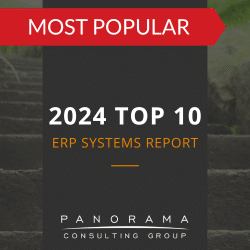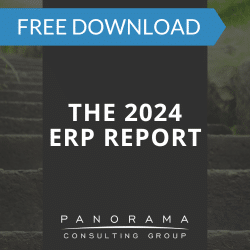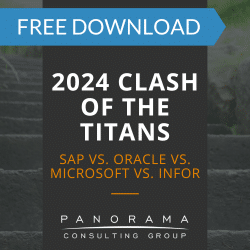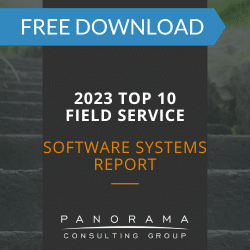In more and more companies, accounting is being automated, and for good reason. Not only does automation – using enterprise resource planning (ERP) software – provide more robust and precise calculations, but it also helps reduce the potential for human error.
So, more specifically, how does ERP help accounting? The answer lies in ERP software’s ability to offer deep visibility into every facet of your books, delivering the insights required to fuel more informed and timely business decisions.
The 2024 ERP Report
88.5% of respondents said they deployed or plan to deploy AI at their organization. Learn about AI adoption and other ERP trends by downloading our latest report.
Today, we’re discussing the emerging role of ERP in the field of accounting and exploring the many ways these two are an integration you can’t afford to skip.
ERP vs. Basic Accounting Software
Accountants rely on accurate, real-time data to keep their companies financially healthy. With the lightning-quick pace of the digital era, you can’t afford to wait on updates or click through layers of folders to find the information you need.
For some small business owners, basic accounting software is the only solution required to keep their finance department on track. However, most of these solutions are limited at best and can’t keep up with the demands of a large-scale, growing enterprise.
In general, basic accounting software, like QuickBooks, only focuses on one specific area of your business: your financial accounts. This software usually covers the following areas:
- Accounts receivable and payable
- Financial reporting
- Banking
- Simple revenue and sales recording/tracking
On the other hand, ERP software takes a more widespread, comprehensive look at how your accounting department ties into and contributes to your enterprise as a whole. It works by combining all the real-time data and transactions across your various business processes into a centralized data warehouse that you can access at any time.
In addition to all the above-mentioned functionality, ERP also includes tools to help you achieve tighter control over every department across your company, helping you manage the following:
- Customer relationship management
- Supply chain management
- Inventory
- Logistical requirements
- Warehouse operations
- Ecommerce
If you’re looking for a QuickBooks alternative, you may want to look for an ERP vendor that focuses on functionality that’s useful to not only your finance department but to all departments.

8 Benefits of ERP for Accounting
Now that you know a little more about the benefits that ERP systems provide over basic accounting software, you’re probably wondering about the other accounting-related benefits of ERP software. Or, you may be wondering what accounting-related ERP requirements you should include in the request for proposal you submit to ERP vendors.
In either case, let’s take a look at a few of the top benefits of ERP for accounting:
1. Real-time Data
An ERP system delivers real-time insight into the financial health of your company. In turn, key stakeholders can use this data to make important decisions that drive growth.
Looking at outdated spreadsheets that are even a few hours old could lead to inaccurate or ill-informed decision making that could harm the overall financial stability of your company. Accountants require up-to-the-minute visibility to monitor and measure every part of the accounting process.
The best part? Any time you need more detailed data, you can dig deeper into it to mine more thorough insights. This way, you can:
- Monitor costs
- Grow revenues
- Optimize profit margins
With this information in hand, your accounts can deliver the intel necessary to help executives plan inventory, scale production and position your business for unparalleled growth.
2. Improved Data Accuracy
While basic accounting software offers a certain degree of automation, it still requires a significant amount of manual entry.
Any time your accountants are responsible for inputting mission-critical data by hand, there’s an inherent risk of human error. While a slip of the keyboard might not be detrimental in another department, accounting is one in which you cannot afford to transpose numbers or miss a decimal point.
3. More Robust Reporting
While some accounting software solutions allow you to generate basic financial reports, these are limited at best. At most, you’ll be able to generate standard industry documents, including income statements and balance sheets.
Conversely, ERP software allows users to create, download and share many different kinds of reports. These can help you shed light on your company’s financial standing and inform your next move. There are many kinds of personnel that require such insights:
- Business owners
- Shareholders
- Tax and regulatory agencies
- Banks
These stakeholders can use inventory management data to help create future cash flow projections. Or, they can analyze the customer pipeline to create more accurate order status updates and accounts receivable aging reports. Combining various data points in this way isn’t always possible with basic accounting software.
With an ERP platform, you get more than just financial reports. You get an in-depth look at how your teams are performing individually, and as a whole, helping you manage your business as effectively as possible.
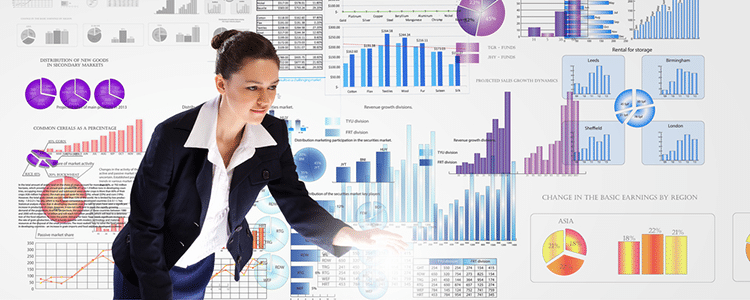
4. Increased Automation
Investing in an ERP solution with dedicated accounting functions helps you completely automate certain financial tasks that were strictly manual before.
For example, you can streamline and connect your accounts receivable database with your accounts payable management and your cash management reports. This way, an update at any point along the chain will trigger a subsequent change in the other.
5. No Duplicate Entries
Not only is it tiring to switch between your ERP system and your accounting software, it’s also tedious when you need to replicate data from one solution to the other. If they remain separate systems, you’ll have to perform this step manually. However, when you invest in an accounting-friendly business technology solution, you can eliminate this step altogether.
6. Helpful Business Intelligence Features
How detailed, interactive and feature-rich is your current ERP financial reporting? One of the top ERP business benefits is the robust business intelligence it provides. With a few clicks, you can achieve a 360-degree view of your financial functions. Charts and graphs visually display your data in a creative and user-friendly format that fuels smarter and quicker decision-making.
You can also leverage ERP business intelligence to set and monitor key performance indicators (KPIs) for your accounting department to ensure every process, person and task is on track. Automatic notifications will alert you if there’s an event that could cause a deviation to these KPIs.
For instance, you’ll know in real-time if your budget is nearing exhaustion or if there are outstanding payments that have yet to be approved.
7. Standardized Financial Processes
When your financial records aren’t up to par, your entire company could suffer the consequences. Important decisions, such as whether to pursue a new business investment, require timely and accurate data. Accessing these records is much easier when there are streamlined and standardized financial processes in place.
With an ERP solution, you don’t have to worry about manually transferring data from one computer system to another. All your data is right on your centralized dashboard for easy viewing. In addition, most of your accountancy tasks, including auditing compliance and reconciliation, are automated for you.
8. Cross-department Collaboration
Your accounting department shouldn’t operate in a silo. Accountants require communication and collaboration with other departments to ensure that your entire infrastructure is operating as it should. An ERP accounting solution enables this collaboration by allowing all teams to access the same centralized database.
This database typically includes information relevant to the following areas:
- Human resources
- CRM
- Sales
- Marketing
- Supply chain management
- And more
When updates from each of these teams are funneled into the same location, key stakeholders are always in the loop. Transparency is possible from every angle, so nothing gets missed.
If your business manages a large volume of data on a daily basis, only an ERP platform can organize, centralize and display all of these disparate points in a way that makes sense and drives your company forward.
What can You do with Real-time Data?
When you implement an ERP system, you’ll gain instant access to real-time data. This allows you to take a more proactive approach to your business needs, not a reactive one.
Here are a few ways you can exercise this newfound visibility:
- Make quicker, forward-thinking business decisions
- Improve the accuracy of your business predictions, goals and future forecasts
- Evaluate business performance from every angle (e.g. location, project, department, customer, vendor, etc.)
- See a snapshot of your entire financial performance (e.g. cash flow, revenue, net revenue, assets, expenses)
- Detect fraud and record errors quicker
- Generate complete, up-to-date reports
Learn More About how ERP Helps Accounting
Implementing ERP functionality into your accounting department isn’t just smart business sense – it can mean the difference between inaccurate, short-sighted recordkeeping and financial stability and growth. ERP provides the big-picture visibility that decisionmakers need to understand their business from every angle.
When your ERP project team is ready to learn more about ERP solutions, we’d love to talk. We’re a team of ERP consultants with the skills and experience to help you evaluate the accounting functionality of various ERP systems.
In addition to ERP selection services, we also provide services like crisis management services and bankruptcy management solutions, which your finance department may be particularly interested in during these uncertain times. Schedule a free consultation below.







